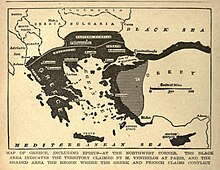
Back فكرة ميغالي Arabic Вялікая ідэя (Грэцыя) Byelorussian Мегали идея Bulgarian মেগালি ধারণা Bengali/Bangla Gran Idea Catalan Megali idea Czech Megali Idea German Μεγάλη Ιδέα Greek Gran Idea Spanish Ideia Handia Basque



The Megali Idea (Greek: Μεγάλη Ιδέα, romanized: Megáli Idéa, lit. 'Great Idea')[1] is a nationalist[2][3] and irredentist concept that expresses the goal of reviving the Byzantine Empire,[4] by establishing a Greek state, which would include the large Greek populations that were still under Ottoman rule after the end of the Greek War of Independence (1821–1829) and all the regions that had large Greek populations (parts of the southern Balkans, Anatolia and Cyprus).[5]
The term appeared for the first time during the debates of Prime Minister Ioannis Kolettis with King Otto that preceded the promulgation of the 1844 constitution.[6] It came to dominate foreign relations and played a significant role in domestic politics for much of the first century of Greek independence. The expression was new in 1844 but the concept had roots in the Greek popular psyche, which long had hopes of liberation from Ottoman rule and restoration of the Byzantine Empire.[6]
Πάλι με χρόνια με καιρούς,
- πάλι δικά μας θα 'ναι!
(Once more, as years and time go by, once more they shall be ours).[7]
The Megali Idea implies establishing a Greek state, which would be a territory encompassing mostly the former Byzantine lands from the Ionian Sea in the west to Anatolia and the Black Sea to the east and from Thrace, Macedonia and Epirus in the north to Crete and Cyprus to the south. This new state would have Constantinople as its capital: it would be the "Greece of Two Continents and Five Seas" (Europe and Asia, the Ionian, Aegean, Marmara, Black and Libyan Seas). If realized, this would expand modern Greece to roughly the same size and extent of the later Byzantine Empire, after its restoration in 1261 AD.
The Megali Idea dominated foreign policy and domestic politics of Greece from the War of Independence in the 1820s through the Balkan wars in the beginning of the 20th century. It started to fade after the Greco-Turkish War (1919–1922), followed by the population exchange between Greece and Turkey in 1923. Despite the end of the Megali Idea project in 1922, by then the Greek state had expanded four times, either through military conquest or diplomacy (often with British support). After the creation of Greece in 1830, it acquired the Ionian Islands (Treaty of London, 1864), Thessaly (Convention of Constantinople (1881)), Macedonia, Crete, (southern) Epirus and the Eastern Aegean Islands (Treaty of Bucharest), and Western Thrace (Treaty of Neuilly, 1920). The Dodecanese were acquired after the Second World War (Treaty of Peace with Italy, 1947).
A related concept is enosis.
- ^ Mateos, Natalia Ribas. The Mediterranean in the Age of Globalization: Migration, Welfare & Borders. Transaction Publishers. ISBN 9781412837750.
- ^ Miller, James Edward (2009-02-01), "Introduction: Manifest Destiny Meets the Megali Idea", The United States and the Making of Modern Greece, University of North Carolina Press, pp. 1–22, doi:10.5149/9780807887943_miller.6, ISBN 9780807832479, retrieved 2022-10-21
- ^ A., Jenkins, Mary (1994). To megali idea - dead or alive? : the domestic determinants of Greek foreign policy. Naval Postgraduate School. OCLC 35675237.
{{cite book}}: CS1 maint: multiple names: authors list (link) - ^ Roumen Daskalov, Tchavdar Marinov, Entangled Histories of the Balkans - Volume One: National Ideologies and Language Policies; BRILL, 2013; ISBN 900425076X, p. 200.
- ^ "European Election Database - Background - Greece". o.nsd.no.
- ^ a b History of Greece Encyclopædia Britannica Online
- ^ D. Bolukbasi and D. Bölükbaşı, Turkey And Greece: The Aegean Disputes, Routledge Cavendish 2004
© MMXXIII Rich X Search. We shall prevail. All rights reserved. Rich X Search